Key takeaways:
- Grief in a hospital setting is deeply personal and requires empathetic listening and understanding from caregivers.
- Support systems, including support groups and community resources, are essential for grieving spouses to share their experiences and feel connected.
- Embracing mixed emotions, rituals, and creative outlets can aid in the healing process and help honor lost loved ones.
- Patience is crucial in the grieving journey, as healing takes time and allows for the coexistence of grief and moments of joy.
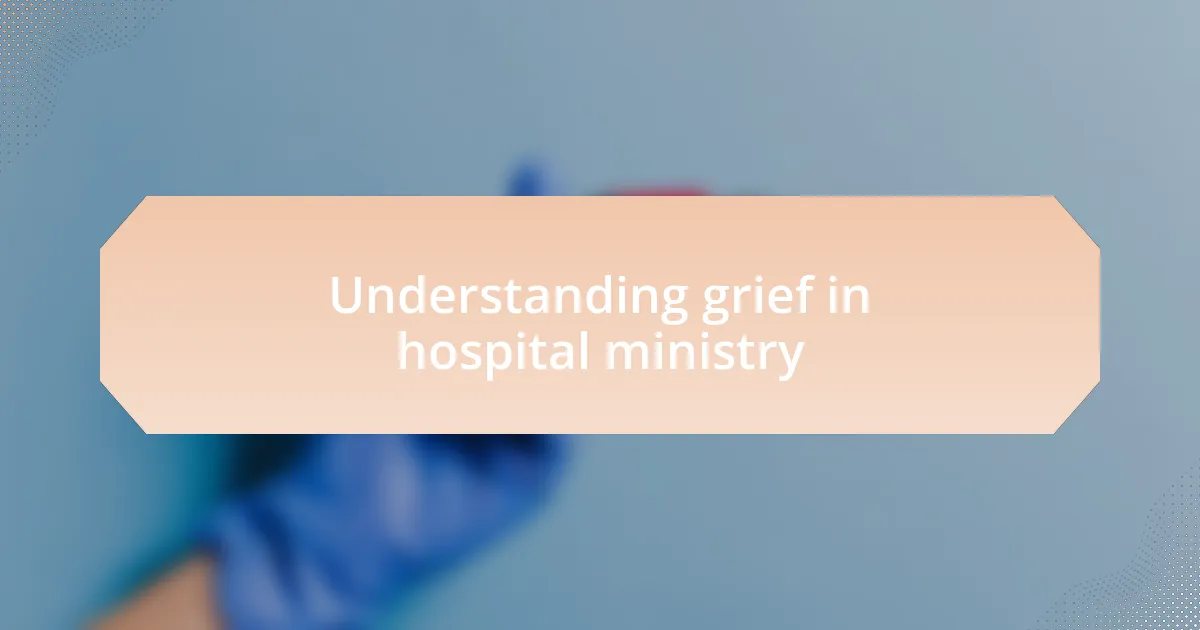
Understanding grief in hospital ministry
Grief in a hospital setting is unique and profound, often amplified by the sterile surroundings that contrast sharply with the emotions pouring from loved ones. I remember visiting a close friend whose spouse was in critical condition; the weight of unspoken fears hung heavy in the air. How do we navigate these overwhelming emotions when faced with such uncertainty?
As I delved deeper into hospital ministry, I realized that each individual’s grief is profoundly personal. I once sat with a widow who, despite her sorrow, expressed gratitude for the care her husband received. Her insight reminded me that even in grief, there can be a desire for connection and understanding. How can we, as caregivers, honor these complex feelings while providing support?
Witnessing families grapple with loss has taught me the importance of listening. In one instance, a daughter shared memories and regrets with tears streaming down her face. It became clear that processing grief is not just about closure but also about celebrating life, allowing space for the full spectrum of emotions. When we acknowledge and validate these feelings, we’re not just meeting the bereaved where they are; we’re walking beside them on their journey through sorrow.
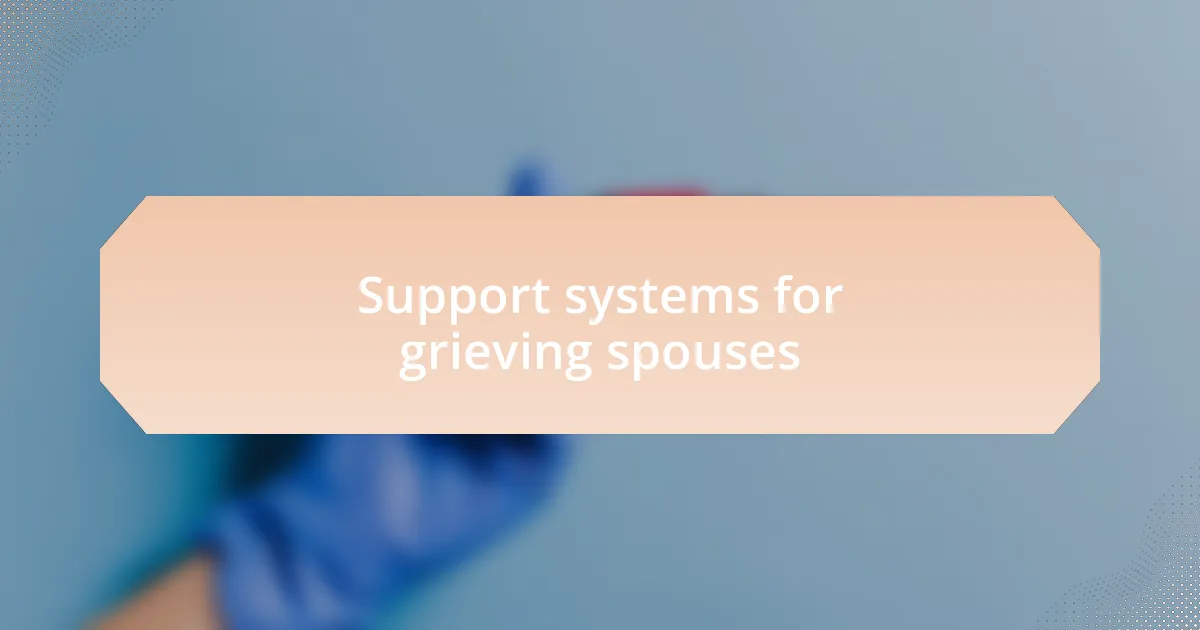
Support systems for grieving spouses
Finding effective support systems can be crucial for grieving spouses navigating their loss. In my experience, support groups can provide a unique space where individuals can share their grief without judgment. I remember attending a session where a widower opened up about his struggle; the shared stories created a powerful sense of camaraderie, reminding us that we are not alone in our experiences.
Family and friends often play a vital role in the grieving process, but their understanding of grief can vary widely. I once had a friend whose attempts to provide comfort felt clumsy but well-intentioned, leading me to appreciate the need for guidance in communicating with the bereaved. It is essential for loved ones to educate themselves on grief’s nuances to offer meaningful support, asking how they can best help rather than making assumptions.
On a more personal note, I’ve found solace in engaging with community resources, such as local faith groups or mental health support services. During my own grieving journey, a counselor introduced me to journaling as a form of expression. It was eye-opening to realize how articulating my thoughts helped me process a flood of emotions I didn’t even know I was holding on to. In what ways have you found healing in expressing your grief?
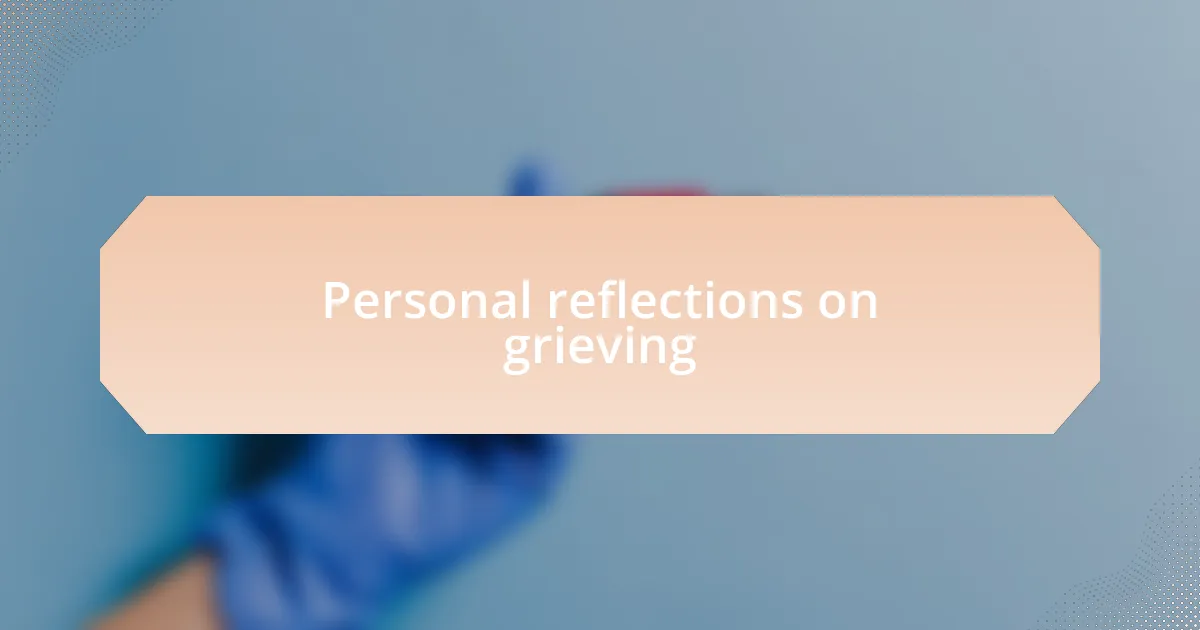
Personal reflections on grieving
Grieving is an intensely personal journey, one that often catches us off guard. I vividly recall moments when the wave of sadness would sweep over me unexpectedly, often triggered by something as simple as a song or a familiar scent. Those moments reminded me that grief isn’t linear; it ebbs and flows, often resurfacing when we least expect it. Have you ever found yourself staring off into space, lost in a memory that brings both pain and warmth?
Reflecting on my own experiences, I realized that each tear carried its own story. There were days when I felt overwhelmingly heavy, and then there were glimmers of joy in remembering the laughter we shared. It became clear to me that embracing these mixed emotions is a vital part of the healing process. I often asked myself what lessons I could draw from our time together, transforming grief into a way to honor those cherished moments.
In private moments of solitude, I learned the value of silence. There were times when it felt as if the world was rushing by, and all I craved was a stillness to sit with my thoughts. During these times, I found it comforting to create a small ritual—lighting a candle or sharing a story aloud. This practice not only helped me reconnect with my spouse’s spirit, but also grounded me in my grief, allowing me to navigate its depths with more clarity. What rituals have you found that bring you closer to your lost loved one?
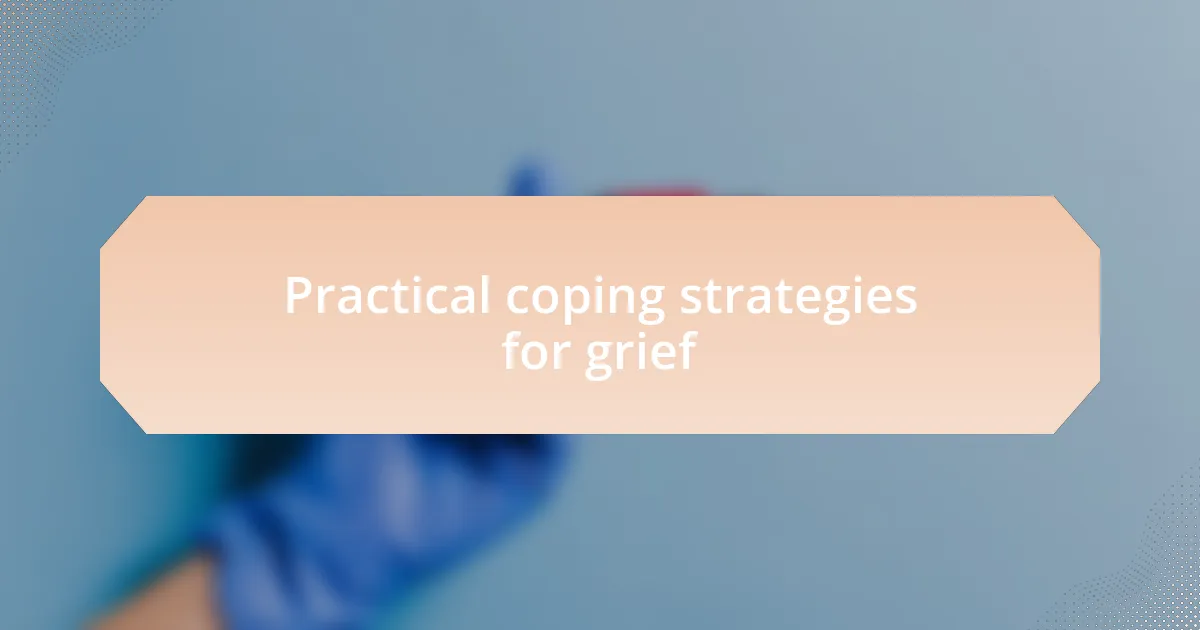
Practical coping strategies for grief
Finding constructive ways to deal with grief is essential. I remember creating a journaling habit during my toughest days. Writing down my feelings transformed my internal chaos into something tangible. It served as a release, and sometimes, I would find surprising clarity in those written words. What have you discovered while documenting your emotions?
In those moments of overwhelming loss, I often leaned on the power of community. I sought out friends and family, sharing my heartache—not for pity, but for connection. There were evenings spent over coffee, where simply having someone listen made a difference. Have you considered reaching out to those around you instead of isolating yourself?
Another strategy that helped me immensely was embracing physical activity. On days when my heart felt the heaviest, going for a walk or a run provided an outlet for my grief. The rhythmic movement and fresh air became a salve for my troubled mind. Have you explored how movement can ease your emotional load?
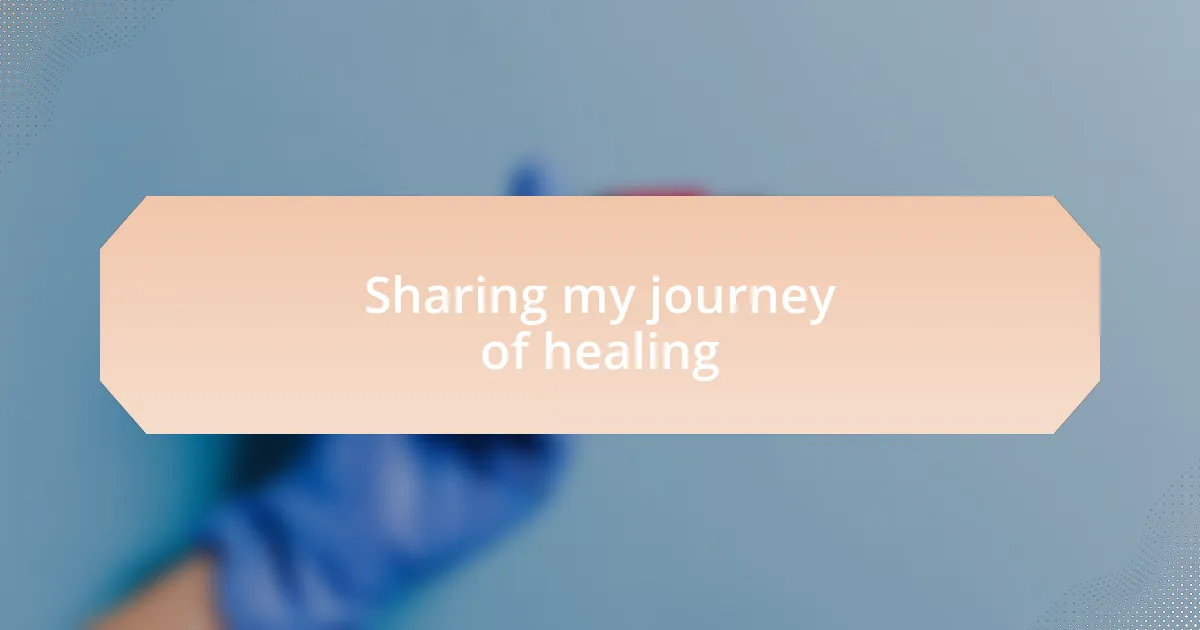
Sharing my journey of healing
The journey of healing is often winding and unpredictable. I vividly recall a day when I stumbled upon a box of old photographs. As I went through them, feelings washed over me—pain, love, and a bittersweet nostalgia. In that moment, I realized that remembering my spouse wasn’t just about mourning their absence; it was also about celebrating the beautiful moments we shared. How can you weave memories into your healing process?
I found solace in developing new routines that honored my journey. On weekends, I started volunteering at a local shelter, which provided me with a sense of purpose and connection to others facing hardships. It was eye-opening to witness resilience in others, and it reminded me that healing isn’t a destination; it’s a series of small steps forward. How might giving back help in your own healing journey?
One of the most profound aspects of my healing was allowing myself to feel joy again, guilt-free. I remember laughing with friends one evening and being surprised at how liberating it felt. It taught me that grief and joy can coexist, and embracing the lighter moments doesn’t diminish my love for my spouse. Have you allowed yourself to experience joy amidst the sadness?

Lessons learned from my experience
Grieving taught me the importance of patience. There were days when the weight of loss felt unbearable, and I wished for an instant fix. However, as I navigated through my sorrow, I learned that healing takes time, just as love does. I often found myself reflecting on why I rushed—what was I afraid of? In acknowledging my grief, I discovered the necessity of allowing myself to sit with those painful emotions rather than pushing them away.
From my experience, I found that expressing my feelings was crucial. I started journaling to document not only my sadness but also my hopes and thoughts about the future. One day, while writing about a particularly hard week, I was surprised to find a spark of inspiration to try painting again—something I had loved in my youth. This creative outlet became a refuge, showing me that expressing grief can lead to rediscovery. How might your own creative passions help you process overwhelming emotions?
Additionally, I realized the value of community in the grieving process. I joined a support group where sharing experiences with others who understood my pain was incredibly healing. One night, I opened up about a dream I had involving my spouse, and to my surprise, others shared similar experiences. This connection reinforced my belief that vulnerability fosters closeness, and in those shared moments, I found hope. Have you considered reaching out and letting others in on your journey?